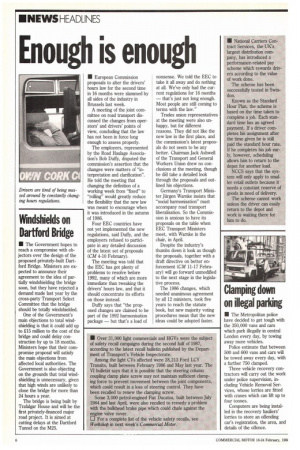Enough is enough
Page 10

If you've noticed an error in this article please click here to report it so we can fix it.
• European Commission proposals to alter the drivers' hours law for the second time in 16 months were slammed by all sides of the industry in Brussels last week.
A meeting of the joint committee on road transport discussed the changes from operators' and drivers' points of view, concluding that the law has not been in force long enough to assess properly.
The employers, represented by the Road Haulage Association's Bob Duffy, disputed the commission's assertion that the changes were matters of "interpretation and clarification". He told the meeting that changing the definition of a working week from "fixed" to "rolling" would greatly reduce the flexibility that the new law was meant to encourage when it was introduced in the autumn of 1986.
Four EEC countries have not yet implemented the new regulations, said Duffy, and the employers refused to participate in any detailed discussion of the latest set of proposals (CM 4-10 February).
The meeting was told that the EEC has got plenty of problems to resolve before 1992, many of which are more immediate than tweaking the drivers' hours law, and that it should concentrate its efforts on those instead.
Duffy says that "the proposed changes are claimed to be part of the 1992 harmonisation package — but that's a load of
nonsense. We told the EEC to take it all away and do nothing at all. We've only had the current regulations for 16 months — that's just not long enough. Most people are still coming to terms with the law."
Trades union representatives at the meeting were also unhappy, but for different reasons. They did not like the new law in the first place, and the commission's latest proposals do not seem to be any better. Chairman Jack Ashwell of the Transport and General Workers Union drew no conclusions at the meeting, though he did take a detailed look through the proposals and outlined his objections.
Germany's Transport Minister Jurgen Warnke insists that "social harmonisation" must accompany road transport liberalisation. So the Commission is anxious to have its proposals on the table when EEC Transport Ministers meet, with Warlike in the chair, in April.
Despite the industry's thumbs down it look as though the proposals, together with a draft directive on better enforcement (CM 11-17 February) will go forward unmodified to the next stage in the legislative process.
The 1986 changes, which needed unanimous agreement by all 12 ministers, took five years to reach the statute book, but new majority voting procedures mean that the new ideas could be adopted faster.
























































































